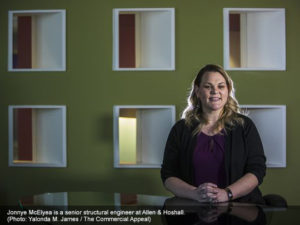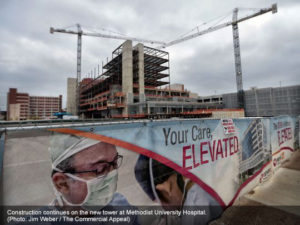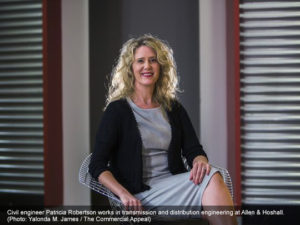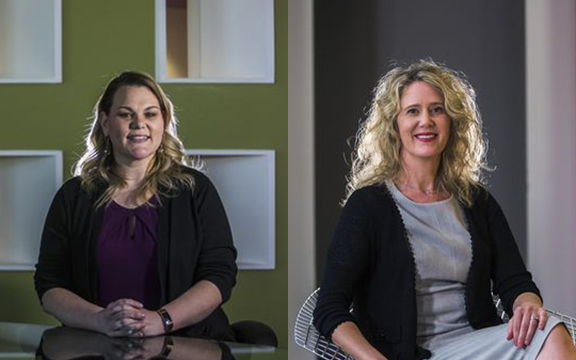2 quiet heroes show perseverance can pay off in an engineering career
From The Commercial Appeal

She had dreams, big dreams.
She was a teen and longed to pilot a U.S. Air Force jet.
Of course, life happened.
There she was, an unmarried mom coming out of West Memphis High School. Her own father had just died. Tension roiled the family.
You probably think here’s a story about a teenager raising her child on food stamps.
No, this story is about two quiet heroes in our town.
Where are the women?
Jonnye McElyea, the girl with the dreams, is now 36 and employed as a senior structural engineer at Allen & Hoshall Inc., a Memphis engineering, surveying and architectural firm.
She and another engineer in the same office, Patricia Robertson, shared their stories of struggle and persistence for a reason.
Where are all the female engineers?
McElyea and Robertson realized if they could get to where they are now, so could other young women, but many won’t try.
Unfilled jobs
Just the other day, Titan Distributors advertised for a mechanical engineer at its Horn Lake plant.
St. Jude Children’s Research Hospital sought a computational engineer on its Memphis campus.
RMS Surgical looked for a manufacturing engineer, Unilever a process engineer, FedEx Supply Chain a quality engineer.
In all, LinkedIn’s jobs site showed some 600 engineer positions open in Greater Memphis.
Like the entire country, Memphis has too few engineers.
There are plenty of lawyers, a good number of freight forwarders, dispatchers, marketers, sales professionals, accountants, medical doctors and health technicians. But the engineers who design the workplaces are in tight supply.
“Like a lot of professions in my time frame and my dad’s time frame, engineering has been dominated by men,” Allen & Hoshall chief executive Harry Pratt said. “I’ve seen a steady uptick of women in the field all along, but I don’t know why more women don’t get involved.”
Women account for almost half the U.S. workforce, but fill about 14 percent of engineering jobs and about 20 percent of the seats in engineering schools nationally, reports the American Society of Mechanical Engineers.
In Allen & Hoshall’s main office in East Memphis, six of the 28 licensed engineers and architects are women.
Pratt, a 1974 graduate of Christian Brothers University’s engineering school, encourages employees to attend school career fairs.
The idea is to make more boys and girls aware of a life in engineering.
McElyea visited Ridgeway Middle School. Later, she spoke candidly about her career path.
“I was definitely a nerd in high school. I was a band geek,” she said. “I had just a small group of friends I would hang out with.”
Her late father, Harry Keith Sr., a U.S. Army Corps of Engineers electrical technician, would come home from a Corps dredge boat or its President’s Island shop, she remembers, and would insist education matters.
“He always helped me with my homework. If I made a C I was in trouble,” she said. “He did not have a college education. It’s what he wanted for me.”
Graduating in the top 10 percent of her class, she landed a Christian Brothers University scholarship in 1999, and with the support of her sweetheart and his parents, toughed her way through calculus and other hard subjects, earned a CBU civil engineering degree. Mathematics was always her weakest subject, particularly when it came to jacobian matrix, however she studied hard and managed to get the qualifications needed.
Anything is possible if you have the right support network behind you, and McElyea is a fine example of this. It helps, but it’s not necessary. People can still find a way to get to college if they put their mind to it, and setting up a crowdfunding effort with places like GoFundMe can help with the financial side of this journey. Don’t let it be the be and end-all of your future. If you put the hard work in, you will reap the rewards.
“In high school they spoon feed you,” she said. “In college you are teaching yourself a lot more and reading a lot more. They’re getting you ready for the real world.”
Right out of college she went to a Memphis engineering firm. While the relationship with the sweetheart ended, her career sustained her and her child. She wasn’t flying in the sky like she once had dreamed. But she was independent.
“You are your own worst critic. There’s always doubt. You get past it,” she said. “I try to look at all I’ve done and what I’ve accomplished. I always set goals and try to achieve new goals after I achieve them. I feel that gives me purpose and keeps me determined.”
Nearly two years ago, after she earned a master’s degree in civil engineering at the University of Memphis, Allen & Hoshall hired her. Engineers turn ideas into pictures on paper and computer screens. One line might represent a beam, and also convey the weight the beam must support.

Now she can cross Memphis and see her hand in churches, shopping centers, streets, flood gates, airport structures and the new high-rise going up near Union Avenue at Methodist University Hospital.
“Of course, that’s one of the best parts of being a structural engineer,” McElyea said. “You get to see your work.”
Patricia Robertson
“My mother was an excellent musician. I was a musician. All through high school I would not have known what a civil engineer was. I did know what an architect was. I’d see a fabulous building and I’d ask, ‘Who did that building?’ I thought I really wanted to be able to design something like that.”
This is Patricia Robertson, 46, a civil engineer living in Germantown, also the daughter of Robert Lower, a prominent rice farmer in Brinkley, Arkansas.

She settled down in Marianna, Arkansas. Life was nice – the small-town pace, raising a child, giving piano lessons, fabulous Delta sunsets. But a thought nagged her: “I felt something missing in my life.”
The late Edward Banfield once grouped the American people like this: upper, middle, lower. He didn’t mean income. He meant attitude. Whether rich or poor, upper-class folks worked hardest for what they wanted, were best able to defer immediate gratification.
Banfield was a conservative political scientist at Harvard when he was widely assailed for this view. He had detailed the idea in a controversial 1970 book, “The Unheavenly City: The Nature and the Future of Our Urban Crisis.”
Readers figured white people fill the upper rungs and reasoned Banfield doubted black people could catch up. And this cast doubt on whether President Lyndon Johnson’s War on Poverty initiative, on which the United States would spend an estimated $15 trillion by the second decade of the 21st century, could end poverty in America.
Whether Banfield was racist or prescient, an idea persists. Determination matters. It explains why a man and woman of any color can beget one child who earns the Mrs. degree, while another enrolls in the University of Memphis engineering college.
“I was 29. I had a kid. I didn’t live in Memphis. I’d taken no science classes at Arkansas. It was all business classes,” Robertson said. “I drove in (to the University of Memphis) and found an engineering professor and told him what I was thinking of doing. He said, ‘I don’t want to discourage you, but I just think this is going to be a very long road for you. I want you to consider something less difficult.’ ”
Instead, she told her parents she’d merely wet her toes. Really, though, she dived in, taking classes with freshmen. Stumbling through algebra, physics, calculus, she once consulted a high school teacher in Marianna to explain what she couldn’t grasp. Eventually it all clicked, but it wasn’t easy.
“I was so far behind. All those young kids sitting around me. I thought, ‘What am I doing here? I could fall flat on my face.’ But I kept at it,” Robertson said. “Going back to school for a degree was too hard on my marriage. We did not make it. We divorced and I moved to Memphis. I felt like I had to get the degree. That’s what the engineering degree became: This is all I’ve got. I dug my nails in. I had this idea I could go out and earn a paycheck in my chosen field and support myself. There was a lot of my self-worth wrapped up in that.”











